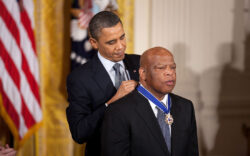You can’t make this stuff up! As this year’s race for the presidency draws to a close, the American election of 2020 is a surreal mixture of the comic and the karmic, like an off-the-rails political potboiler novel co-written by Fletcher Knebel, Will Rogers and Stephen King.
President Donald Trump has triple troubles with his taxes, coronavirus and a boorish performance that turned what was supposed to be a debate into a debacle. His Democratic opponent, former Vice President Joe Biden, took a post-debate campaign swing while Trump entered a hospital for treatment of the COVID-19 that he had long downplayed from his presidential bully pulpit in the White House and at his campaign rallies. Americans expressed both sympathy and schadenfreude as Trump and many of those closest to him—including wife Melania, campaign manager Bill Stepien, White House press secretary Kayleigh McEnany, several aides and three Republican senators—found that the coronavirus could attack the powerful along with the powerless
Novelist Fletcher Knebel died in 1993, long before Trump assumed the presidency, but today’s political theater of the absurd would have provided rich material for the writer. Knebel is most famous for the book Seven Days in May, which he co-authored with Charles Bailey II. That 1962 novel tells the tale of an attempted takeover of the United States by rogue military officers. In 1965 Knebel published Night of Camp David, in which a fictional president goes mad after cracking under the strain of his job. Reading from a psychology textbook, one of the book’s characters delineates the president’s symptoms: “The individual feels that he is being singled out and taken advantage of, mistreated, plotted against, stolen from, spied upon, ignored or otherwise mistreated by his ‘enemies’ … Although the evidence which the paranoiac advances to justify his claims may be extremely tenuous and inconclusive, he is unwilling to accept any other possible explanation and is impervious to reason.”
Will Rogers was a Depression-era comic and satirist who skewered politicians of both major parties before his death in a plane crash in 1935. His humor brought laughter from President Franklin Roosevelt and from millions of Americans wearied by economic downturns and rising crime rates in the 1930s. “I am not a member of any organized political party. I am a Democrat,” he quipped. With his working-class wit and his pithy political insights, Rogers would still be relevant in Trump’s America with observations like, “I don’t know jokes. I just watch the government and report the facts.”
Horror writer Stephen King is still alive today at age 73. His 1978 novel The Stand wove a chilling and prescient story of a worldwide pandemic threatening civilization. Novels like The Shining made him the master of the macabre, but today King says, “Donald Trump is worse than any horror story I’ve written.” The author lambastes Trump in interviews and online, saying “Folks willing to give Trump a pass because their 401(k)s are swelling remind me of Italians willing to give Mussolini a pass because he made the trains run on time.”
Knebel, Rogers and King could write a mixed-up political novel about these mixed-up political times, but today’s Republicans who genuflect at the altar of Trumpery would do better to read the wise words of one of their own, Sen. Margaret Chase Smith of Maine. Before her death in 1995, Smith became an iconic Republican politician as the first woman to serve in both chambers of Congress. In the perilous years after World War II she used her political power to fight the rise of her fellow Republican the demagogic Sen. Joe McCarthy of Wisconsin. In a 1950 speech that she called her “Declaration of Conscience,” she said, “I don’t want to see the Republican Party ride to political victory on the Four Horsemen of Calumny—Fear, Ignorance, Bigotry and Smear… I want to see our nation recapture the strength and unity it once had when we fought the enemy instead of ourselves.”
Like what you just read? Support Flagpole by making a donation today. Every dollar you give helps fund our ongoing mission to provide Athens with quality, independent journalism.










